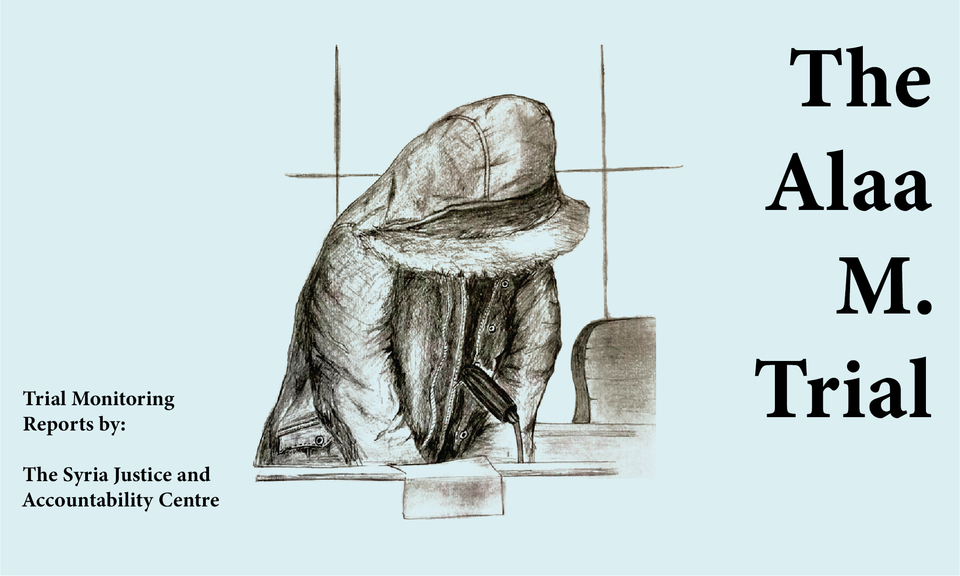
Inside the Alaa M. Trial #30: Lamb Among Wolves
Higher Regional Court – Frankfurt, Germany
Trial Monitoring Summary #30
Hearing Dates: December 20, 2022
CAUTION: Some testimony includes descriptions of torture.
Note that this summary is not a verbatim transcript of the trial; it is merely an unofficial summary of the proceedings.
Throughout this summary, [information located in brackets are notes from our trial monitor] and “information placed in quotes are statements made by the witness, judges or counsel.” The names and identifying information of witnesses have been redacted.
SJAC’s 30th trial monitoring report details day 48 of the trial of Alaa M. in Frankfurt, Germany. The Judges read out 30 pages of 500+ page case file. The section concerned the report and evaluation of the Federal Criminal Police Office (BKA) following the confiscation of a mobile phone. Essentially, the report demonstrated that M. had a substantial interest in a third person who supposedly falsely accused M. The BKA further found that M. contacted the Syrian embassy and requested assistance to return to Syria. In the ensuing questioning M. repeatedly claimed that he was falsely accused. He said that he believed that all charged events had happened, but that it was a case of mistaken identity.
Highlights:
Day 48 – December 20, 2022
The Court dedicated the session to a file memo concerning the evaluation of evidence by the BKA from 2021. The memo was read out and images were inspected according to § 256 StPO (Code of Criminal Procedure). The memo contained the report of the BKA that detailed a data analysis of a mobile phone which the police confiscated from the Accused.
The analysts searched the data using keywords in German and Arabic as well as names, phone numbers and e-mail addresses. The keywords included but were not limited to ‘military hospital’, ‘mass grave’, ‘torture’, Branch 261’, ‘martyr’, ‘Tartous Hospital’, and ‘Tishreen Hospital’. The police subsequently translated and evaluated hits when they were connected to chat communication. Furthermore, the police discovered photos and screenshots. The police concluded that the photos were predominantly private; photos related to the activities in Homs or Branch 261 were not detected. However, the police also found that the phone was not the property of the Accused, yet he had used it to a certain extent.
Moreover, the assessment of chat communication showed that M. was seeking information on the possibility of leaving Germany. Information suggested that he organized travel documents and attempted to contact persons abroad. The chat further contained information about the Attorney General (GBA). M. informed one of his contacts that the GBA kept a file about him. According to the BKA, M. collected information related to leaving Germany such as flight options. The BKA concluded that the declared psychological stress for him and his family following the accusations, but also the potential opening of a criminal investigation against him, were reasonable explanations for the desire to leave the country. The BKA based its assumptions in part on the discovery of the sentence “I have to think about taking off.” The information available further showed that M. contacted a tourism agency. The conversation revealed that they checked flights to Beirut since the airport was open during the pandemic, but also connections between Germany and Damascus on various dates. The BKA further found that the Accused sought support from the Syrian embassy. According to the report, M. sent a letter to the Embassy and submitted a return form.
In addition, several chats were discovered in which M. rejected the accusations against him. He demonstrated a substantial interest in a person who allegedly falsely accused him because they had a dispute back in Syria. The BKA report detailed all relevant information M. collected about this person. Based on the findings, the BKA concluded that M. actively investigated him and even supported the hacking of the latter’s account. M’s friends and family supported him. The objective was to demonstrate that the witnesses were Islamists and not credible.
In the ensuing questioning by the Judges, M. repeatedly claimed that the accusations against him were false. He argued that the person who accused him via the media invented all of it because they had a dispute about a broken rule during Ramadan. M. further acknowledged that the torture and mistreatment which the survivor witnesses had to endure most likely happened, but he had not committed the acts. It was a case of mistaken identity.
___________________________
For more information or to provide feedback, please contact SJAC at [email protected] and follow us on Facebook and Twitter. Subscribe to SJAC’s newsletter for updates on our work.